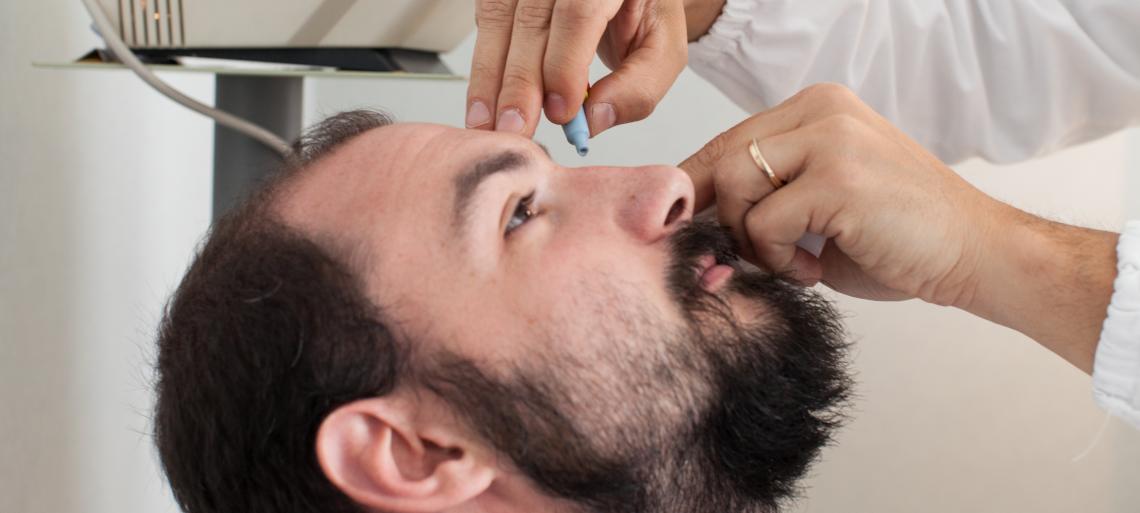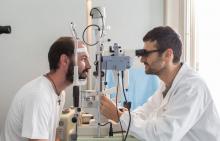What is the ophthalmic examination?
The ophthalmic examination consists in the evaluation of the health of the eyes, which are particularly important sense organs because it is through them that most of the information on the world surrounding us goes through.
The eye examination is carried out by a medical specialist, the ophthalmologist who, in addition to examining the functionality of the patient's visual acuity, performs the biomicroscopic examination of the various segments of the eye (front and back) in order to identify the presence of risk factors or eye diseases under way.
Why is it necessary?
An eye examination is used by the ophthalmologist to assess the health of the patient's eyes and to measure their visual capacity at all distances.
Through the eye examination, the ophthalmologist can rule out or diagnose any diseases that could lead to reduced vision, like certain diseases of the nervous system, as well as systemic risk factors, including diabetes, hypertension, rheumatic diseases and cancer.
An eye examination can also help your ophthalmologist determine if there are any risk factors that could lead to long-term eye disease like macular degeneration and glaucoma.
How often should an eye examination be carried out?
As far as the frequency of eye examinations is concerned, if the disease has already been diagnosed, it is advisable to undergo check-ups at set intervals to monitor its progress.
However, as many eye diseases are asymptomatic, regular examinations are still advisable, especially after the age of forty and if the patient's family members are affected by pathologies.
Besides, it is advisable for patients to undergo an eye examination following trauma or injuries involving the eyes and whenever they experience the following:
- Lowered visual acuity;
- Blurred vision;
- change in colour perception;
- appearance in the visual field of dots, spots, halos, blotches;
- decrease in visual field.
How does it take place?
The ophthalmic examination is carried out first with the objective examination of the eyelids and the biomicroscopic evaluation of:
- tear film;
- conjunctiva;
- cornea;
- crystalline lens;
- retina.
Specific tests are then performed to detect:
- ocular motility;
- visual acuity, i.e. the eye's ability to read letters and see images placed at a certain distance;
- pupillary function, for which the ophthalmologist examines the size, shape and responsiveness of the pupils to light stimuli;
- intraocular pressure, which must not exceed certain values otherwise there is a risk of developing irreversible damage to the optic nerve;
- the condition of the ocular fundus, i.e. the ophthalmoscopic examination of the posterior segment through which the ophthalmologist, with the help of eye drops to dilate the pupil, examines the vitreous (the gel inside the eye), the optic nerve and the retina.
The eye examination does not require any special preparation. However, it is advisable for contact lens wearers to stop wearing them at least one day before the examination.
Contraindications and risks
An eye examination has no contraindications and carries no risks whatsoever.
However, it is good to know that the effect of the eye drops used to dilate the pupils, lasts for about 2 hours, causing blurred vision and glare. It is therefore advisable for the patient not to drive a car for two hours after the examination.
Ophthalmology and Ophthalmic Surgery at Auxologico
The Auxologico Ophthalmology and Ophthalmic Surgery clinic covers all needs related to the health and correct functioning of the eye.
Eye examinations and ophthalmological diagnostic examinations can be carried out at all the Auxologico centres using modern, high-precision equipment.
There are numerous specialist centres for the treatment of specific pathologies: from the Glaucoma Centre to the Paediatric Glaucoma Centre, from Neuro-ophthalmology and Ocular Electrophysiology to low vision.
At the Capitanio Hospital, surgery is carried out on all eye diseases (cataract, retina, glaucoma, cornea).


